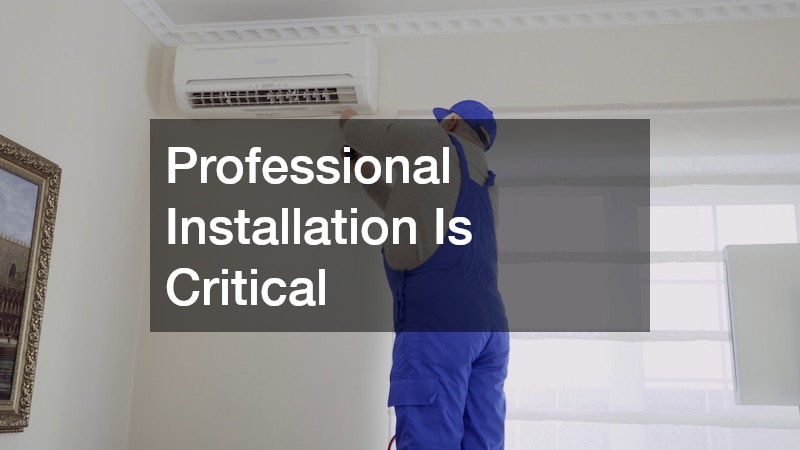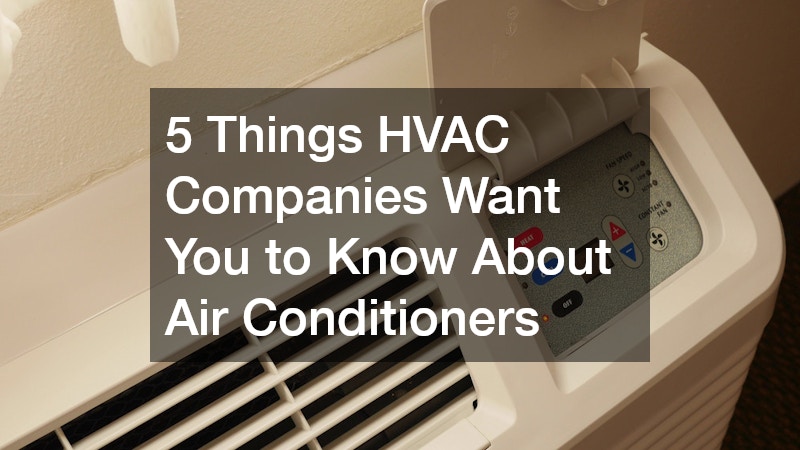Air conditioning is no longer just a luxury; it has become a necessity for comfort and health, especially in regions with extreme temperatures. Many homeowners and businesses rely on air conditioners to maintain indoor air quality, regulate humidity, and provide consistent cooling. HVAC companies emphasize that understanding how these systems work and how to maintain them can save consumers both time and money while enhancing overall comfort.
While many people know how to turn their air conditioner on and off, fewer understand the complexities behind its performance. From energy efficiency to proper installation, several aspects determine whether a system operates optimally.
Learning these insights allows homeowners to make informed decisions, avoid common mistakes, and keep their cooling systems running efficiently year-round.
Understanding Air Conditioner Efficiency
Air conditioner efficiency is measured by how effectively a system converts electricity into cooling power. High-efficiency units use less energy to achieve the same level of comfort, which can significantly reduce utility bills over time. HVAC companies often stress the importance of choosing a system with a strong Seasonal Energy Efficiency Ratio (SEER) rating, as this reflects how efficiently the unit operates under typical conditions. Efficiency is not only a matter of cost savings but also environmental responsibility, since energy-efficient systems produce a smaller carbon footprint.
System efficiency can be influenced by several factors beyond the unit itself. Proper insulation, correctly sized ductwork, and regular maintenance all contribute to peak performance. For example, a system that is too large for a home may cycle on and off frequently, reducing efficiency, while a poorly maintained air conditioner can lose a significant percentage of its effectiveness due to clogged filters or worn-out components. Understanding these nuances ensures your system performs at its best.
Common Maintenance Misconceptions
Many people assume that air conditioners require minimal upkeep, thinking that as long as they turn the system on, it will continue to work reliably. HVAC companies want consumers to know that regular maintenance is essential to prevent breakdowns and maintain efficiency. Skipping routine tasks like cleaning coils, replacing filters, or inspecting refrigerant levels can lead to decreased performance and higher repair costs. Proper maintenance also improves indoor air quality, which is crucial for health and comfort.
Some homeowners believe changing filters once a season is enough, but depending on usage and environmental conditions, filters may need monthly attention. Ignoring maintenance can lead to frozen coils, uneven cooling, and strain on the system’s compressor. By scheduling regular inspections with a licensed technician, minor issues are identified early, preventing expensive emergency repairs and prolonging the life of the air conditioner.
Signs Your System Needs Repair
Air conditioners often give subtle warnings before a significant failure occurs, and recognizing these signs can save both time and money. Strange noises, uneven cooling, or unexpected spikes in energy bills can indicate underlying issues. HVAC companies encourage homeowners to respond promptly to these symptoms rather than delaying service, as small problems can escalate into costly repairs. Early detection is crucial for maintaining comfort and avoiding disruptions during peak usage periods.
Unusual sounds such as grinding, rattling, or hissing may signal mechanical wear, loose components, or refrigerant leaks. Uneven cooling, where some rooms are colder than others, often points to ductwork issues or airflow restrictions. Monitoring energy consumption can also reveal problems; a sudden increase in electricity usage without a change in thermostat settings suggests the system is working harder than necessary. Timely intervention by a qualified technician ensures efficient operation and reduces the risk of complete system breakdown.
The Importance of Proper Installation
Even the most advanced air conditioning unit will underperform if it is not installed correctly. HVAC companies stress that professional installation is critical to ensure the system operates efficiently and safely. Proper placement, correct sizing, and precise connections are all factors that influence performance. Poor installation can lead to frequent repairs, reduced lifespan, and higher energy bills, negating the benefits of purchasing a high-quality unit.
For instance, an oversized system may cool the air too quickly, resulting in short cycling that puts unnecessary stress on components. Undersized units may run continuously without reaching the desired temperature, increasing wear and energy costs. Incorrect refrigerant charging, improper sealing of ductwork, or inadequate insulation can also diminish system efficiency. Hiring trained professionals ensures all elements meet manufacturer specifications, allowing the air conditioner to perform optimally from day one.
Tips for Extending System Lifespan
Taking proactive steps can significantly extend the life of an air conditioner, saving homeowners money and reducing environmental impact. HVAC companies emphasize regular maintenance, mindful usage, and prompt repairs as key strategies for longevity. Simple habits such as keeping vents clear, adjusting thermostats responsibly, and scheduling annual inspections help the system operate efficiently while preventing unnecessary strain. Longevity not only reduces replacement costs but also ensures reliable comfort for many years.
Consider investing in a programmable thermostat to minimize excessive runtime and reduce wear on components. Keeping the outdoor unit free from debris and vegetation ensures adequate airflow, which is critical for heat exchange. Routine professional inspections allow technicians to identify and address minor issues, such as worn belts or low refrigerant levels, before they escalate. Following these practices helps homeowners maintain a consistent cooling environment and protects their investment in the long term.
Air conditioners are complex systems that require attention, knowledge, and proper care to function effectively. Understanding efficiency, maintenance needs, signs of trouble, installation requirements, and lifespan-extending strategies allows homeowners to make informed decisions that enhance comfort, reduce costs, and improve reliability. By recognizing the insights HVAC companies provide, consumers can avoid common pitfalls and ensure their systems operate at peak performance throughout their lifespan.
Being proactive with maintenance, responding to early warning signs, and working with qualified professionals ensures that air conditioning systems remain effective and efficient. These measures not only protect financial investments but also create a safer, more comfortable indoor environment. Awareness, diligence, and informed decision-making are the keys to enjoying reliable cooling for years to come.




